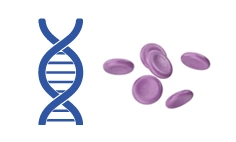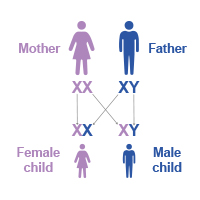Hemophilia Carriers — Inheritance, Statistics, and Symptoms
Hemophilia is a hereditary bleeding disorder affecting both men and women, in which blood does not clot properly. Historically, the focus on hemophilia has been predominantly on men due to hemophilia’s X-linked recessive condition; however, women who are carriers of the gene face unique challenges and misconceptions concerning the inheritance patterns of hemophilia.
Hemophilia is a hereditary bleeding disorder affecting both men and women, in which blood does not clot properly. Historically, the focus on hemophilia has been predominantly on men due to hemophilia’s X-linked recessive condition; however, women who are carriers of the gene face unique challenges and misconceptions concerning the inheritance patterns of hemophilia.
Understanding hemophilia inheritance
A hemophilia carrier is typically a female who has one copy of the gene mutation that causes hemophilia. While hemophilia is often associated with men, female hemophilia carriers can also experience symptoms. Understanding why females are carriers of hemophilia—and how it’s inherited—is key to diagnosis, management, and genetic counseling.
A hemophilia carrier is typically a female who has one copy of the gene mutation that causes hemophilia. While hemophilia is often associated with men, female hemophilia carriers can also experience symptoms. Understanding why females are carriers of hemophilia—and how it’s inherited—is key to diagnosis, management, and genetic counseling.

Why are only females carriers of hemophilia?
While hemophilia is more common in men, women can also be affected if both X chromosomes carry the mutation or if one X chromosome is affected and the other is non-functional. Women carriers of the hemophilia gene may experience symptoms of hemophilia, challenging the misconception that women can only be carriers and not have hemophilia.
While hemophilia is more common in men, women can also be affected if both X chromosomes carry the mutation or if one X chromosome is affected and the other is non-functional. Women carriers of the hemophilia gene may experience symptoms of hemophilia, challenging the misconception that women can only be carriers and not have hemophilia.
Can a male be a carrier of hemophilia?
No. Men inherit one X chromosome from their mother and one Y chromosome from their father. If the X chromosome from the mother carries the affected gene, men will have hemophilia – not carrier status. Women have two X chromosomes and are considered carriers if they inherit one affected gene. However, this carrier status does not preclude women from experiencing symptoms themselves.
No. Men inherit one X chromosome from their mother and one Y chromosome from their father. If the X chromosome from the mother carries the affected gene, men will have hemophilia – not carrier status. Women have two X chromosomes and are considered carriers if they inherit one affected gene. However, this carrier status does not preclude women from experiencing symptoms themselves.
How do children inherit hemophilia?
Being a hemophilia carrier means there is a chance of having a child affected by hemophilia. For female hemophilia carriers who have a mutation on one of their two X chromosomes, there is a:
- 50% chance of having a male child affected by hemophilia
- 50% chance of having a female child who is a hemophilia carrier
The diagram below shows how children inherit chromosomes from each parent.
Being a hemophilia carrier means there is a chance of having a child affected by hemophilia. For female hemophilia carriers who have a mutation on one of their two X chromosomes, there is a:
- 50% chance of having a male child affected by hemophilia
- 50% chance of having a female child who is a hemophilia carrier
The diagram below shows how children inherit chromosomes from each parent.

How do I know if I am a hemophilia carrier?
It is possible for a female to be unaware of her hemophilia carrier status. Testing is typically offered if a new hemophilia diagnosis has occurred in an affected family member, or if a biological female is having symptoms herself.
Genetic testing for hemophilia carrier status will determine the carrier status and confirm if a woman or her child carries the hemophilia gene. Testing options include:
- DNA analysis to detect the gene mutation through a blood test, saliva test, or cheek swab
- Factor VIII level testing to assess clotting ability through a blood test
If genetic testing determines the hemophilia gene is present, testing for factor levels may be useful to show hemophilia severity.
It is possible for a female to be unaware of her hemophilia carrier status. Testing is typically offered if a new hemophilia diagnosis has occurred in an affected family member, or if a biological female is having symptoms herself.
Genetic testing for hemophilia carrier status will determine the carrier status and confirm if a woman or her child carries the hemophilia gene. Testing options include:
- DNA analysis to detect the gene mutation through a blood test, saliva test, or cheek swab
- Factor VIII level testing to assess clotting ability through a blood test
If genetic testing determines the hemophilia gene is present, testing for factor levels may be useful to show hemophilia severity.
Where can I get tested for hemophilia carrier status?
A healthcare provider can order a test to determine hemophilia carrier status. This can be done by a primary healthcare provider, as well as a doctor specializing in hematology or genetics.
A healthcare provider can order a test to determine hemophilia carrier status. This can be done by a primary healthcare provider, as well as a doctor specializing in hematology or genetics.
Understanding factor levels and lyonization
Why do blood clotting factor levels vary between carriers?
Genes responsible for making blood clotting factors (Factor VIII) are located on the X chromosome. Women have 2 copies of X chromosomes and when one of the X chromosomes is affected, she is a carrier of hemophilia. Carriers of hemophilia may have clotting factors in the normal range (50% to 150%), and some have lower levels of clotting factors than the normal range. This variation is influenced by lyonization—random inactivation of one X chromosome in each cell. Lyonization can affect the blood clotting factor levels, which can increase bleeding risk.
Genes responsible for making blood clotting factors (Factor VIII) are located on the X chromosome. Women have 2 copies of X chromosomes and when one of the X chromosomes is affected, she is a carrier of hemophilia. Carriers of hemophilia may have clotting factors in the normal range (50% to 150%), and some have lower levels of clotting factors than the normal range. This variation is influenced by lyonization—random inactivation of one X chromosome in each cell. Lyonization can affect the blood clotting factor levels, which can increase bleeding risk.
What is lyonization?
Lyonization occurs when one of the two X chromosomes is randomly inactivated in each women’s cell. Typically, women who carry the gene for hemophilia have approximately 50% of normal level of clotting factor, as roughly half of their cells deactivate the "healthy" gene. However, certain carriers may experience even lower clotting factor levels due to more of the "X" chromosomes containing the normal gene being inactivated.
Lyonization occurs when one of the two X chromosomes is randomly inactivated in each women’s cell. Typically, women who carry the gene for hemophilia have approximately 50% of normal level of clotting factor, as roughly half of their cells deactivate the "healthy" gene. However, certain carriers may experience even lower clotting factor levels due to more of the "X" chromosomes containing the normal gene being inactivated.
Understanding hemophilia carrier symptoms
Can hemophilia carriers still show symptoms?
Yes. Despite common beliefs, a carrier of hemophilia can exhibit symptoms of hemophilia. Approximately 1 in 4 carriers will have symptoms, which can range from mild to severe. Symptomatic hemophilia carriers have clotting factor levels <40% and demonstrate bleeding symptoms, while asymptomatic carriers do not exhibit bleeding despite similar factor levels.
Yes. Despite common beliefs, a carrier of hemophilia can exhibit symptoms of hemophilia. Approximately 1 in 4 carriers will have symptoms, which can range from mild to severe. Symptomatic hemophilia carriers have clotting factor levels <40% and demonstrate bleeding symptoms, while asymptomatic carriers do not exhibit bleeding despite similar factor levels.
What symptoms are typically seen in hemophilia carriers?
The severity of hemophilia carrier symptoms correlates with the individual's Factor VIII levels. Symptomatic carriers can experience bleeding symptoms, including:
- Nosebleeds
- Easy bruising
- Heavy menstrual periods
- Bleeding after childbirth or surgery
The severity of hemophilia carrier symptoms correlates with the individual's Factor VIII levels. Symptomatic carriers can experience bleeding symptoms, including:
- Nosebleeds
- Easy bruising
- Heavy menstrual periods
- Bleeding after childbirth or surgery
Key takeaways
- Females who are carriers for hemophilia are crucial to understanding the inheritance patterns of men and women
- Hemophilia carriers often have distinct experiences and may exhibit symptoms that necessitate tailored care and management strategies
- Recognizing carrier status and symptoms can help both carriers and their families receive appropriate genetic counseling, monitoring, and care
- Females who are carriers for hemophilia are crucial to understanding the inheritance patterns of men and women
- Hemophilia carriers often have distinct experiences and may exhibit symptoms that necessitate tailored care and management strategies
- Recognizing carrier status and symptoms can help both carriers and their families receive appropriate genetic counseling, monitoring, and care
